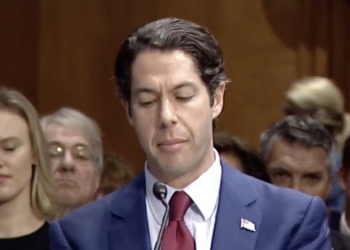Elliot Keck is the Head of Campaigns for the Taxpayers’ Alliance.
Search inheritance tax into Google news and take a look at what comes up. At the point at which I’m writing this the top three stories are as follows: “Could I give £250 gifts to 400 people who then pay them to my daughters to beat inheritance tax on £100,000?”; ‘My wife and I have £700k pensions written in trust – can we dodge Labour’s inheritance tax grab?’ and “Do pension inheritance tax rules affect how I should take my retirement pot?”.
This is madness. We as a nation spend an absurd amount of time and money stressing out about the death duty. There are vast teams of advisers in countless firms being paid huge amounts of money and spending an extraordinary amount of time to develop expertise, all so they can exploit the many loopholes in the tax on behalf of their clients.
And yet, there is no sustainable argument to scrap these loopholes. We’ve seen what happens when you cut agricultural property relief and business property relief. The intention may be to close a loophole used by the wealthy to avoid inheritance tax. The consequence is to decimate family farms and family businesses.
So we end up with this mess of a system, which raises pathetically little revenue. The only logical, coherent solution is to abolish the whole thing.
In particular, it’s the only conservative solution. The Opposition is rightly hammering the Labour government at present on the issue of a wealth tax, with Kemi Badenoch raising this issue at Prime Ministers’ Questions. But of course inheritance tax is a wealth tax, in all but name. If the Conservatives oppose wealth taxes in principle, as they should, they should be proposing a complete abolition of inheritance tax.
Given how vital it is to ensure that abolishing inheritance tax is in the next Conservative manifesto is, we at the TPA have produced a helpful guide containing all Conservatives need to know.
Firstly, and this cannot be repeated enough, the public absolutely loathe it. A majority of all Brits want it cut or abolished, and every group polled except for those with a PhD rank it as the most unfair tax out of a list.
Despite how unpopular it is, it represents a rounding error in Treasury revenues. Less than one per cent of total tax revenue in 2023-24 came from inheritance tax; that is less than stamp duty, fuel duty, tobacco duty and alcohol duty. At £7.5 billion in receipts it wouldn’t take much action on spending to cover the cost of the lost revenue – and that’s before you even assume that its abolition could influence behaviour in a way that ends up driving growth. A sensible reduction in foreign aid, the scrapping of unnecessary EDI roles, and cutting the cost of public sector trade union facility time would get you most of the way there.
Then there is the absurd complexity of it, part of the reason why it is so despised. Just look at the allowances needed for gifts to limit the tyrannical nature of the tax.
An individual can give up to £3,000 tax free in gifts and carry over unused exemptions for one year. But on top of that, an individual can give gifts of up to £250 to an unlimited number of people as long as none of these people receive gifts from the £3,000 allowance. Birthday and Christmas gifts are separate, as are wedding gifts. And as long as someone lives for seven years after handing over a portion of their wealth, it is not subject to any tax at all, however much is passed on – meaning it’s a tax on bad luck as much as anything.
One of the great myths that needs to be busted is the claim that it only impacts a small number of people. The stat often mentioned is that only five per cent of estates are subject to inheritance tax.
But this is a terrible proxy for the number of people actually impacted by the tax. Firstly, it doesn’t capture the estates that managed to avoid inheritance tax through careful tax planning; these are still estates impacted by the tax, even if they don’t end up paying it.
It also does not tell you anything about how many people are involved in the division of each estate. They will have siblings, children, friends and more who may have an interest or part in anything left over. All of them grieving; all now facing a potential tax bill. And while it may “only” be five per cent of estates liable now, by 2029-30 it is set to be 9.5 per cent due to frozen thresholds.
This dreadful tax is completely unnecessary. It’s by no means the norm: New Zealand, Norway, Portugal, and Sweden are just a few countries with no or limited inheritance tax. There is much that the next Conservative policy offering needs to focus on. But when it comes to tax reform, abolition of the hated death duty must be a priority.


![Former Bravo Star Charged After Violent Assault Using a Rock-Filled Sock in Tennessee Walmart [WATCH]](https://www.right2024.com/wp-content/uploads/2025/07/Former-Bravo-Star-Charged-After-Violent-Assault-Using-a-Rock-Filled-350x250.jpg)




![Karoline Leavitt Levels CNN's Kaitlan Collins and Other Legacy Media Reporters [WATCH]](https://www.right2024.com/wp-content/uploads/2025/07/Karoline-Leavitt-Levels-CNNs-Kaitlan-Collins-and-Other-Legacy-Media-350x250.jpg)
![Man Arrested After Screaming at Senators During Big Beautiful Bill Debate [WATCH]](https://www.right2024.com/wp-content/uploads/2025/06/Man-Arrested-After-Screaming-at-Senators-During-Big-Beautiful-Bill-350x250.jpg)
![Illegal Alien Walked Free After Decapitating Woman, Abusing Corpse for Weeks [WATCH]](https://www.right2024.com/wp-content/uploads/2025/07/1753013138_Illegal-Alien-Walked-Free-After-Decapitating-Woman-Abusing-Corpse-for-350x250.jpg)







